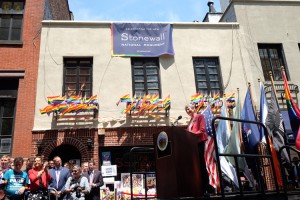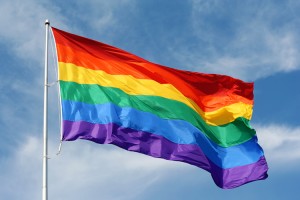LGBT Pride: Stonewall Uprising 50
June 28, 2019
Today, June 28, is the 50th anniversary of the beginning of the Stonewall uprising, which took place in New York City in late June and early July 1969. The uprising consisted of a series of demonstrations for gay rights. A police raid at the Stonewall Inn, a gay bar in the Greenwich Village neighborhood, triggered the uprising. Following the raid, bar patrons and other supporters began a series of riots that lasted, on and off, for several days. The Stonewall uprising was an important event in the modern gay rights movement. The movement later came to be called the lesbian, gay, bisexual, and transgender (LGBT) rights movement.

The Stonewall National Monument was dedicated on June 27, 2016. Credit: U.S. Department of the Interior
A number of commemorations and exhibitions are marking the Stonewall uprising’s 50th anniversary. In New York City, the world’s largest gay pride march, WorldPride NYC, is sharing its billing with “Stonewall50.” Events include a rally at the Stonewall Inn and walking tours of Greenwich Village led by the NYC LGBT Historic Sites Project. New York University’s Grey Art Gallery, the Leslie-Lohman Museum, the Museum of the City of New York, the New York Historical Society, the New York Public Library, and the Brooklyn Museum are all hosting Stonewall Inn-themed exhibitions. Stonewall uprising events are also being celebrated at museums and LGBT pride events in Boston, Chicago, Houston, San Francisco, and other cities.

The rainbow flag has represented the gay community since 1978. Credit: © Natasha Kramskaya, Shutterstock
In the early morning of June 28, 1969, police officers entered the Stonewall Inn. The bar was a gathering place, especially for gay men and male cross-dressers. Cross-dressers are people who wear the clothing and take on the appearance of a different gender. Most gay bars in the United States at this time were often raided by police officers enforcing immoral conduct laws. Such laws punish behavior that a society considers to be indecent. In addition, many of the gay bars in American cities, including the Stonewall Inn, were owned by or had ties to organized crime.
However, on June 28, the officers closed the Stonewall Inn on the basis of an improper license to sell alcohol. Some patrons in the bar were arrested. Others resisted arrest. A number of patrons gathered outside and began a small protest against the police action. Some patrons and other people on the street claimed that the police were abusing patrons. The crowd grew larger as more people gathered to watch the police activity. Some people threw coins, rocks, and other items at the police.
A riot began as a portion of the Stonewall Inn was set on fire. Many members of the crowd chanted “gay power,” and some people destroyed nearby property. It took several hours for the police to end the riot. However, violent protests erupted around the Stonewall Inn for the next few days.
The Stonewall uprising was an important part of the change happening in the gay rights movement at the time. In the late 1960’s and early 1970’s, the gay rights movement grew in numbers and strength. Gay rights activists created new organizations and developed political strategies still used today. The anniversary of the Stonewall uprising is commemorated every summer as part of gay pride celebrations in the United States. In 2000, the U.S. Department of the Interior designated the Stonewall Inn and the surrounding streets a national historic landmark. In 2016, U.S. President Barack Obama designated the Stonewall Inn as a national monument, making it the first official National Park Service monument to honor the LGBT equality movement. For more on the Stonewall uprising, see the biography of Marsha P. Johnson, an African American LGBT rights activist.
In the United States, June is celebrated as LGBT Pride Month. Throughout June, cities across the nation host concerts, festivals, colorful parades, parties, and other events that honor the identity, contributions, and historical impact of LGBT people.


